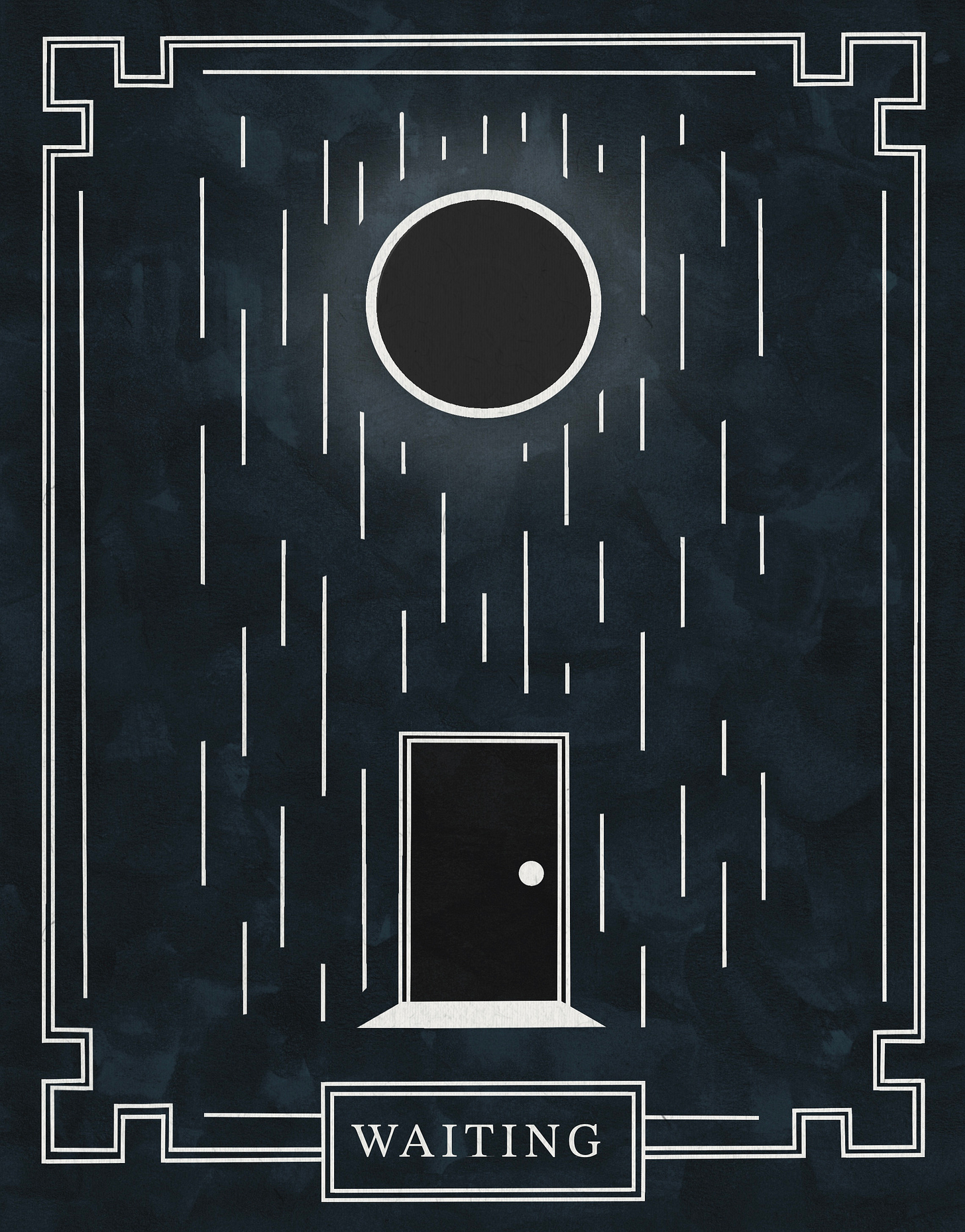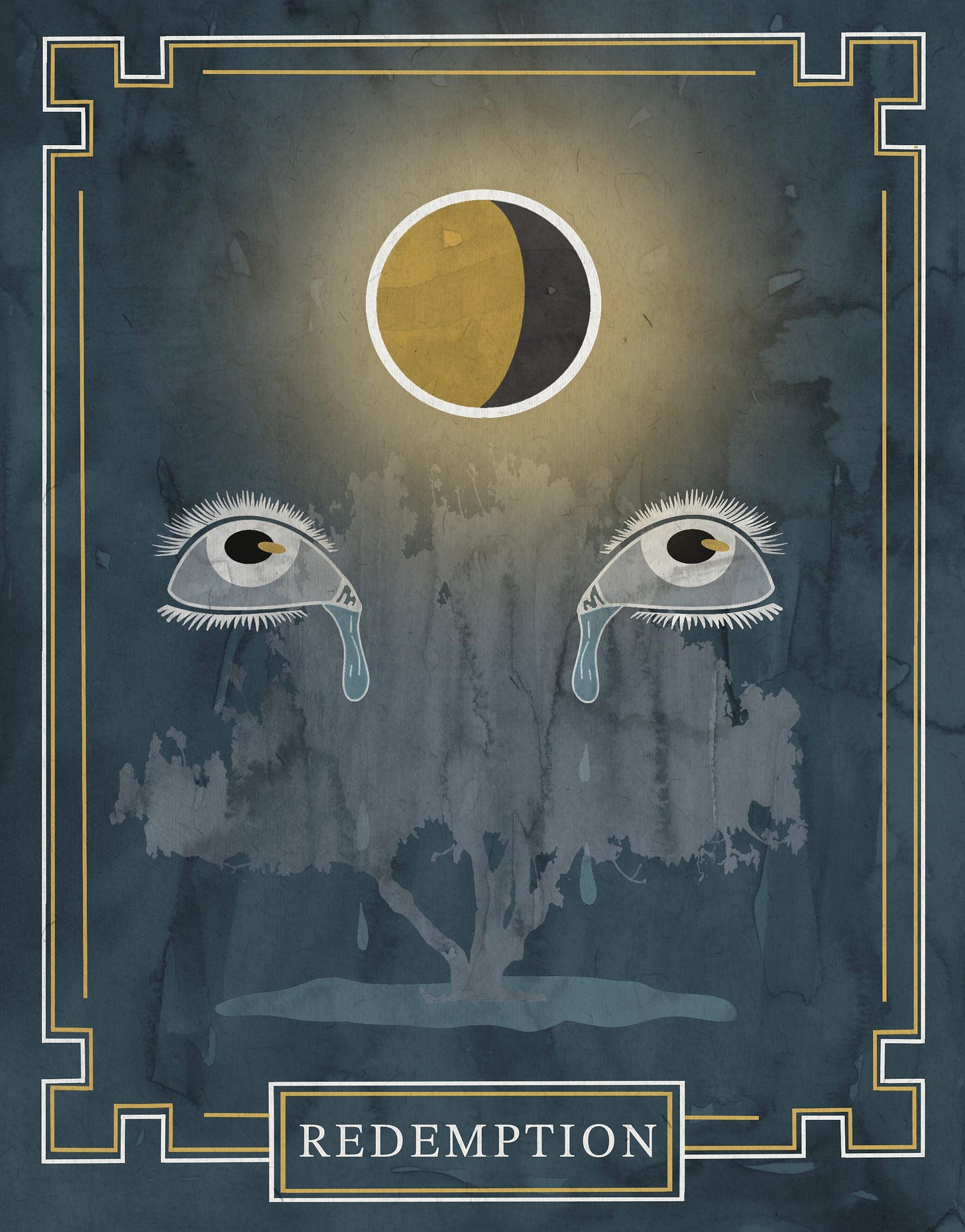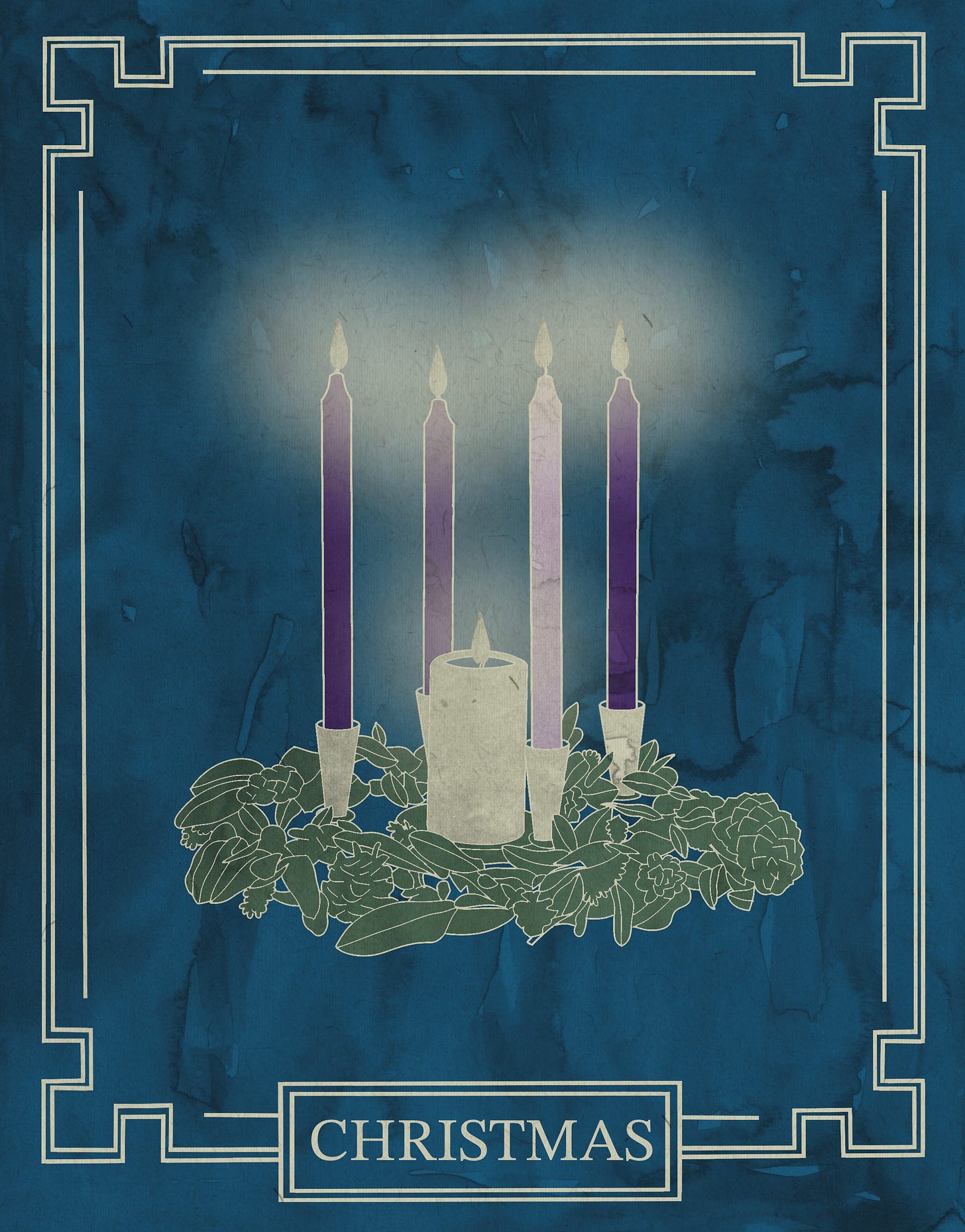We begin in the dark.
As most of you know, the season of Advent begins this Sunday. Of all the seasons in the Christian calendar, Advent has maybe been the toughest for me to get my head around. Not growing up with Advent as an observed “thing,” all I had was a vague cultural connotation for it - Bad Chocolate Calendars, occasional purple and pink decorations, and that was about it. Since moving into a context that leans into Church history and the observation of the Christian year, I am learning to embrace it more. But it has still been tough for me to really give Advent its own space and not just think of it as Christmas+ or some sort of Pre-Christmas.
“We wait on the arrival of Christ.” But for us at this point in history we KNOW of Christ’s arrival. So can this waiting be something more than some kind of play-acting? How do you feel tension in a story when you know the happy ending by heart? Hope, Peace, Joy, and Love – these are all beautiful desires that are evoked in Christ’s coming at Christmas. But if we forget the waiting, the longing, and the uncertainty, I’m not certain we can fully appreciate the coming of that light. So, we begin in the dark.
This year, I read a collection of reflections and sermons from Dietrich Bonhoeffer called “God Is in the Manger.” If you are unfamiliar with Bonhoeffer’s story, I cannot rightly share it all in this space. But for these reflections it’s most important to know that Bonhoeffer was a German pastor in the 1930’s who widely and clearly criticized Hitler and the rise of Nazism. He, of course, became an enemy of the regime, and found himself arrested. Much of his Advent writings were from this time in prison. Eventually Bonhoeffer was killed by the Nazis just days before their surrender. So when Bonhoeffer says that “Life in a prison cell may well be compared to Advent,” I think this gives us a clear perspective of someone who understands what it means to be in the dark. Instead of the traditional themes of Advent, this collection arranges the weeks into themes that have helped me really lean more into this contemplation – Waiting, Mystery, Redemption, and Incarnation. So, a few pieces and some scattered thoughts on those themes.
“Waiting is an art that our impatient age has forgotten.”
I think there is a difference between waiting for something you know will come and waiting for something you are not sure of. It’s connecting with this later form that really helps us lean into the spirit of anticipation of the miracle of Christ’s arrival. A person waiting for a paycheck they have earned does not assume the same posture and does not know the same need as someone waiting, as a beggar, for a gift they may never receive. Christ stands at the door, as that beggar, and knocks. How can we hear that knock if we ourselves do not know lack or suffering or want? Bonhoeffer writes “Advent can only be separated by those whose souls do not know peace. The emptier our hands, the better we understand the beggar. The poorer our quarters, the better we understand our hearts as Christ’s home on earth.” In our waiting, we stand at the closed door, in anticipation that it will be opened to us and we may be welcomed in. And in this waiting, we pray that we may better hear Christ at our door in the form of the beggar, the refugee, and the stranger.
Blessed are you who are poor,
for yours is the kingdom of God.
Blessed are you who hunger now,
for you will be satisfied.
Blessed are you who weep now,
for you will laugh.
“God does not go the way that people want to prescribe for him. Rather His way is beyond comprehension.”
The mystery of our faith, was, is, and will be the way God chose to come to us and redeem us. The pious could not believe that a messiah would come as a carpenter, and not a conqueror. They could not believe his miracles would be done for the sick and the outcast and the enemy. And they were confounded. And we cast shame on them. But, truly, are we any less confounded now? What are the images we have made for Christ today? Do we think we see him in the powerful, the politician, the wealthy, the building, the programs, the numbers, the attendance, and our own goodness? Or does Christ still come to us as the unseen or the reviled. Bonhoeffer writes “It is a mystery because God became poor, low, lowly, and weak, out of love from humankind. God became a human, like us, so that we would become divine…God is not ashamed of the lowliness of human beings. God marches right in. He chooses people as his instruments and performs his wonders where one would least expect them. God is near to lowliness. He loves the lost, the neglected, the unseemly, the excluded, the weak and broken.” As we begin to begin to move out of darkness and towards the hope of coming light, where are we looking for Christ? Can we embrace the mystery and see Him as he chooses to come, or does our piety and self-image make him what we want?
“For the foolishness of God is wiser than human wisdom, and the weakness of God is stronger than human strength. Brothers and sisters, think of what you were when you were called. Not many of you were wise by human standards; not many were influential; not many were of noble birth. But God chose the foolish things of the world to shame the wise; God chose the weak things of the world to shame the strong. God chose the lowly things of this world and the despised things—and the things that are not—to nullify the things that are”
“So, in his love for real human beings, Jesus becomes the one burdened by guilt. Indeed, the one upon whom all human guilt ultimately falls and the one who does not turn it away. But bears it humbly and in eternal love.”
The first line of this blog and many of these thoughts herein have relied upon the writings of Rev. Fleming Rutledge. She writes that Advent is “superficially understood as a time to get ready for Christmas, but in truth it’s the season for contemplating the judgment of God. Advent is the season that, when properly understood, does not flinch from the darkness that stalks us all in this world.” Advent bids us to take a “fearless inventory” within the dark, and to trust in the reality of the judgment of God. But we must also not forget that Christ’s coming is for the redemption of the world. Christ comes to reverse the order of things. His upside down kingdom dethrones the powerful, humbles the proud, and lifts what is lowly and makes it glorious. And so we can take this inventory in the darkness and face it truthfully, because we do not have to fear. Christ, sinless, has taken our guilt and shame as his own. Bonhoeffer – “It is the love of God that makes Jesus guilty. Out of selfless love for human beings, Jesus leaves his state as the one without sin, and enters in to the guild of human beings. He takes it upon himself…A sinless nature and guilt bearing are bound together in him indissolubly. As the sinless one, Jesus takes guilt upon himself and under the burden of this guilt he shows that he is the sinless one.” And so we are admonished to reflect and inventory and trust in God’s judgment. But we are not to fear, for we know the light is coming. Our redemption draweth nigh.
Look up, you whose gaze is fixed on this earth, who are spellbound by the little events and changes on the face of the earth. Look up to these words, you who have turned away from heaven disappointed. Look up, you whose eyes are heavy with tears and who are heavy and who are crying over the fact that the earth has gracelessly torn us away. Look up, you who, burdened with guilt, cannot lift your eyes. Look up, your redemption is drawing near. something different from what you see daily will happen. Just be aware, be watchful, wait just another short moment. Wait and something quite new will break over you: God will come.”
“Stand up and lift up your heads, because your redemption is drawing near… Look at the fig tree and all the trees. When they sprout leaves, you can see for yourselves and know that summer is near. Even so, when you see these things happening, you know that the kingdom of God is near.”
“Christmas will come once again. The great transformation will once again happen. God will have it so. Out of the waiting, hoping, longing world, a world will come in which the promise is given. All crying will be stilled. No tears shall flow. No lonely sorrow shall afflict us anymore.”
Immanuel. God with us. But perhaps not in the way we expect. Christ came in the womb of an unmarried virgin. Born as a child, poor and weak in the eyes of the world. Confounding expectations. Becoming human so that we may really, truly become human ourselves. We are the weak and the poor and the lowly, and Christ is our brother. Bonhoeffer writes “Nothing greater can be said – God became a child. In the Jesus-child of Mary lives the almighty god. Wait a minute! Don’t speak! Stop thinking! Stand still before this statement. God. Became. A Child. There he is. Poor like us. Miserable and helpless like us. A person of flesh and blood, like us. Our brother. And yet, He is God. He is might. Where is the divinity – where is the might – of a child? …His poverty in the manger is His might. In the might of love He overcomes the chasm between God and humankind. He overcomes sin and death. He forgives sin and awakens from the dead. Kneel down before this miserable manger, before this child of poor people and repeat in faith the stammering words of the prophet – Mighty God – and He will be your God, and your might.”
“That is the mystery of the redemption of the world; everything past and everything future is encompassed here.”
Christ’s coming is the great turning point of history. The presence of God, made-flesh, to live among us. In the incarnation, Christ becomes our Tabernacle. A doorway to the Holy is now flung open to all. A lampstand is now the light of the world made flesh. The commandments and covenants no longer held in an ark, but now fulfilled. And a table of bread and of wine, now become body and blood.
Immanuel. God truly with us.
“In the beginning was the Word, and the Word was with God, and the Word was God. He was with God in the beginning. Through him all things were made; without him nothing was made that has been made. In him was life, and that life was the light of all mankind. The light shines in the darkness, and the darkness has not overcome it.”
Thanks, as always, for stopping by and reading. I hope you will check out this collection from Bonhoeffer for Advent. I don’t know if I did it any amount of justice, but it was really meaningful to me this year. It’s a fairly quick read and there’s also a free audiobook version if you happen to be an Audible subscriber.
Many thanks to my good friend Fr. David Harvey for long text chains and chats about these pieces as I worked through them.
This week actually marks my one-year “art”-iversary. It was a year ago around Thanksgiving that I bought a little online course on “art basics” and picked up a pen and pencil for the first time in year to try and make something. It’s pretty weird to see how simultaneously fast and slow this year has gone by. I certainly didn’t expect to be doing something like this. So it continues to be very humbling and mean a lot that you cared enough to subscribe and read these things. So thank you again.










Thank you Darek.
Wow! Good writing. Think it will take reading it several times to really grasp everything. Thanks for sharing.